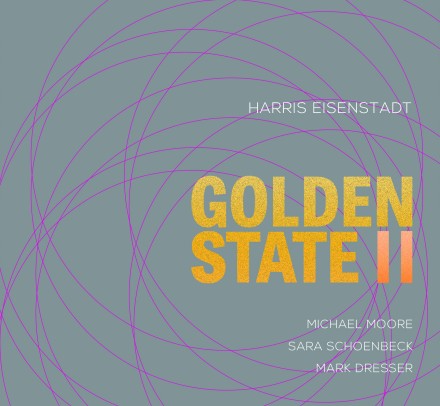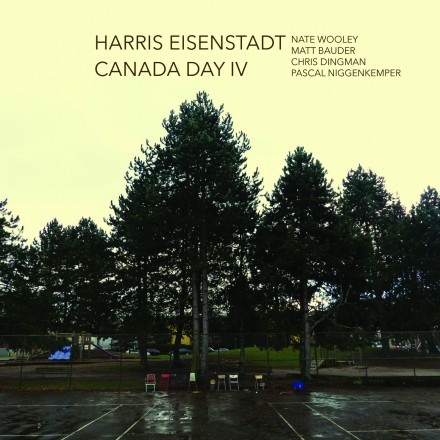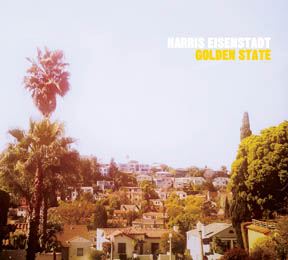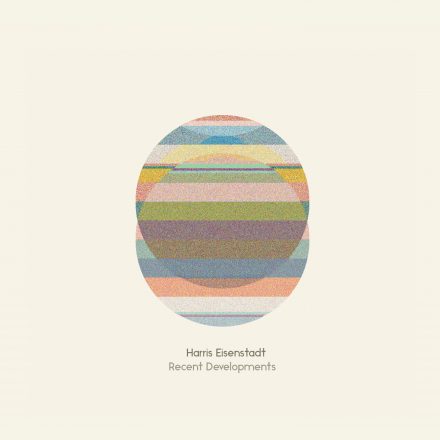Harris Eisenstadt
Golden State II
SGL 1610-2“His wise compositions suggest intricate, haunting textures that blur the distinction between the composed elements and highly personal, improvised interpretations…Exploration of the acoustic instruments’ timbral range and generous freedom enabled each musician to expand on their own unique language.”
–Eyal Hareuveni, All About Jazz (covering the 2014 Music Unlimited Festival in Wels, Austria)
For Harris Eisenstadt’s second release with his Golden State quartet, we recorded in concert at the 2014 Vancouver jazz festival, and Michael Moore’s clarinet replaces Nicole Mitchell’s flute, as Nicole was not available for the Canadian festivals tour. As Harris says, “Golden State has been a kind of serendipitous special project. The genesis of it came about while I was in residence at California Institute of the Arts in 2012. Sara [Harris’s wife] came out with me, and I thought since Mark Dresser and Nicole Mitchell lived in Southern California, it would be a nice opportunity to get the four of us together in a small group setting. It went great, so it seemed like the project should have some life. Same thing this time around: Michael stepped in, and the direction of the group changed. It took on this interesting life in different ways than it did the first time. Michael has a beautiful, playful, lyrical style, a harmonically fluid style; a supremely natural way of playing melodically and harmonically and rhythmically all at the same time, all in such deep ways. He brings a wonderful sense of spontaneous ensemble interplay that I’ve always loved in his work with two long-standing groups, ICP Orchestra and Available Jelly. He really introduced his own sense of spontaneous orchestration to Golden State, which worked great.”
As before, the basic concept of the band is putting orchestra instruments in chamber and improvising contexts; influences include Eric Dolphy, Yusef Lateef, and the AACM, particularly Wadada Leo Smith, whom Harris studied with at CalArts, and Henry Threadgill. But there are other differences: “There’s something more straightforward about these songs in a way. They mostly follow fairly conventional forms, even head-solos-head in some cases, though with quite open approaches to solo sections and written materials. As for my own playing, I think there’s a simplicity or an economy of style meant to fit the compositions. If a song doesn’t ask for multiple high-wire acts to come off all at the same time and instead needs one focused task to unfold patiently, then that’s what I’ll do.” We’re still talking about avant-garde chamber jazz, but somehow the feel is earthier, the music is a bit more grounded in jazz, and while the recording is studio-like in its sonic precision, the vibe of a super-attentive audience can be felt in the playing.
As usual with Harris, the titles of the pieces have specific references. “The Arrangement of Unequal Things” is a quote from Richard Ford’s Canada referring to John Ruskin’s idea that composition is the arrangement of unequal things – in this case, “moving between duple and triple feels both in the written materials and as contrasting environments for clarinet and bassoon solos.” “Seven in Six” is a line in 7 on top of a longer line in 6, while “A Particularity with a Universal Resonance” is “three elegiac, meditative sections, and ultimately, a more uplifting strolling section that Michael solos on”; the title is taken from the obit for James Gandolfini in the NY Times. “A Kind of Resigned Indignation” is from the Times’ obit for Nora Ephron: “the solos and overall spirit are definitely indignant.” “Agency” is about “the ways in which each musician negotiates the composition in improvisatory ways.” “Gleaning” refers to “collecting leftover crops after a harvest, an apt reference to my compositional process. To glean also means to extract information. I supplied only so much information to the musicians; they extracted the information they needed and constantly re-cast the materials.”
Since the recording the band has played three gigs with Pascal Niggenkemper on bass, and with Chris Speed subbing for Michael in New York. “So it’s been this fluid project as it turns out, and the one constant ends up being Sara Schoenbeck on bassoon. In the end Golden State is a project built for my wife and me to get to play together in a small ensemble setting. Sara has been my longest active musical partner (in addition to our personal partnership). Since we had our son, Owen, almost six years ago, we have had less opportunity to play together. Wherever Golden State goes in the future, it will always be a small group, chamber-oriented project built on my collaboration with Sara. In a way, it’s in homage to our time together in California; I lived in Los Angeles for seven years, Sara grew up in the Bay Area then lived in L.A. for eleven years.”





